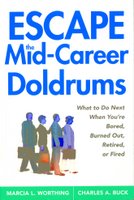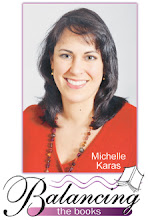Book provides good advice for the successful, but bored, professional

Reviewed: “Escape the Mid-Career Doldrums: What to Do Next When You’re Bored, Burned Out, Retired or Fired,” by Marcia L. Worthing and Charles A. Buck, Wiley, Nov. 2007, $18.95, 204 pages.
If your feel like you’re stuck in a job you have no passion for, uncertain how to make your escape — you’re not alone.
When I graduated from college with my bright, shiny journalism degree and no job, I went to work as a secretary in a chemical company. Frankly, I worried what the dangerous chemicals stored nearby were doing to my health, but it paid the bills. Every day, counting the minutes until my lunch break or until quitting time, I plotted my exit from this occupation.
While the job that “saved” me from the chemical company wasn’t my career salvation (I sold custom-made furniture on a commission-only basis, and was not terribly good at it), it was a stepping stone that helped me to see where my natural abilities did not lie. And, on the bright side, I now know how to accessorize a room.
Those were, no question, the wrong jobs for me, and I knew they were temporary. But even the right job — the right career — can become wrong for you.
Written by a career consultant and a career coach, Marcia L. Worthing and Charles A. Buck, “Escape the Mid-Career Doldrums: What to Do Next When You’re Bored, Burned Out, Retired or Fired,” is a handy reference designed for those who are established in a career and yearn to make a move or for those who are forced out by way of layoffs or who choose retirement but aren’t ready to leave the workforce.
“Escape the Mid-Career Doldrums” offers practical advice and soul-searching exercises to those stuck in what the authors call the “BBRF Syndrome” (bored, burned out, retired or fired). The goal is to get them back on track.
One caveat is that the intended audience is a narrow group: extremely successful business professionals. So, while those of you who are not high-level executives may find some pearls of wisdom, you may be a little put off by the hoity-toity real-life “examples” given.
Here’s one: “Richard, a highly successful human resources executive for a top corporation, had over 200 employees reporting to him and a high-level executive role that allowed him to take on strategic and planning responsibilities. Despite a great salary and other perks, Richard was bored.”
They lost me even before “great salary.” Poor Richard. So misunderstood.
But, I accept that even top-level, high-paid executives get bored. And certainly, in the wake of the economic rollercoaster ride we’ve been on of late, many highly-trained professionals are being abruptly laid off or forced into early retirement.
If you’re a mid-career professional and find yourself out of job, as painful as that may be, the authors say it’s important to keep an open mind. Consider going back to school, starting a consultancy, working part-time or volunteering or working for a nonprofit organization that might benefit from your expertise.
Before doing anything, Worthing and Buck advise readers to get to the bottom of why you were bored with your job, or why you were fired.
“When you don’t know the real cause behind your boredom, burnout, retirement or firing, you can’t respond to it effectively. Your false belief about why something happened will prevent you from emerging from your career blues and discover what you really want to do for the next 10, 20, or 30 years,” they write.
The reality, they say, is that there are “plenty” of opportunities for the mid-career professional, “but a variety of factors make it seem like few opportunities exist.”
Making a change won’t be easy, and just as when I began my career search, you may start out going one direction, only to find it’s not the right path.
“Be open to new opportunities. Just because you had a plan to start your own business or to divide your time between part-time work and travel doesn’t mean you can’t adjust this plan,” the authors write.
Thoughtfully, they remind the reader: If you’re mid-career at 50, you technically have another 25 working years ahead of you.
Labels: Balancing the Books, Escape the Mid-Career Doldrums, Marcia L. Worthing and Charles A. Buck, Michelle Karas, Wiley
 RSS
RSS


